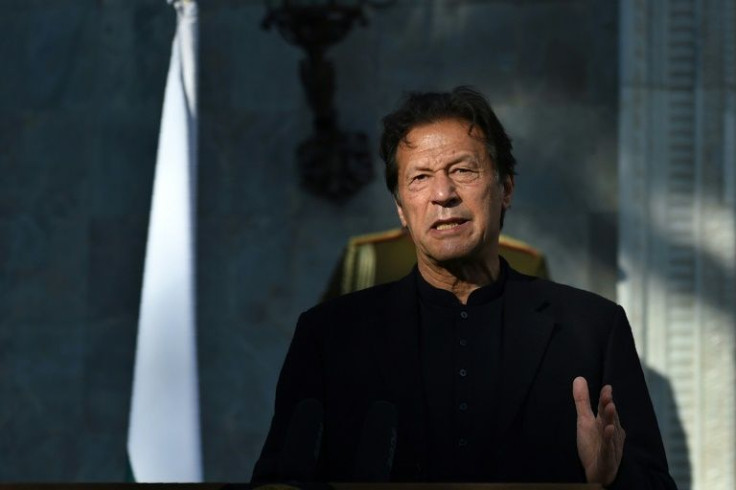A Disgraced Imran Khan Returns To Pavilion To Play To The Gallery

Tens of thousands of protesters took to the street in Pakistan after Imran Khan was ousted in a parliamentary no-trust vote as prime minister of the nuclear-armed South Asia nation which is all set to install Khan's replacement.
Waving party flags and vowing support, Khan's supporters marched in cities across Pakistan and the youth and women, who make up the backbone of Khan's supporters, dominated the crowds.
In the capital of Islamabad, supporters lit up lights as Khan made his way through the crowd atop a brightly colored truck.
A large number of protesters turned up in northern Peshawar city and in eastern Lahore city, crowds chanted slogans against "foreign conspiracy". Khan's supporters held protests in the UK, Australia, and the UAE.
In the port city of Karachi, a massive crowd shouted slogans. "No to imported government," said one placard in Karachi as protesters chanted: "Any friend of America is traitor."
The supporters have accused the U.S. of orchestrating Khan's ouster and Khan's party members walked out of Parliament shortly before the vote on April 10.
Khan has claimed the U.S. worked behind the scenes to bring him down due to displeasure over foreign policy, which favors China and Russia.
A vocal critic of the post 9/11 war on terror, Khan alleged that the U.S. was deeply disturbed by his trip to Russia and meeting with Russian President Vladimir Putin on Feb. 24, the day when Russia invaded Ukraine.
On March 31, Khan had alleged that the U.S. was involved in the attempt to unseat him through the no-confidence motion. On April 3, President Arif Alvi dissolved the National Assembly on Khan's advice. However, the apex court in the country later restored it and ordered it to call a session on the no-trust vote, which was held April 10.
The leading contender to step into Khan's shoes is Shahbaz Sharif, the brother of disgraced former prime minister Nawaz Sharif. Pakistan's Supreme Court has disqualified Nawaz from holding office and he currently lives in London in self-imposed exile after being sentenced to 10 years in jail.
Shahbaz, who was for years chief minister of Punjab province, will have to repair ties with the powerful army and key ally the U.S, and improve a stuttering economy. Shahbaz hailed opposition for "standing up for the Constitution".
Shahbaz heads a rainbow of socialist, liberal, and radically religious parties. Khan's nominee will be his foreign minister Shah Mahmood Qureshi. Parliament will meet on April 11 to elect a new prime minister in the 220 million nation.
General polls will be held in Pakistan in August 2023 unless the new prime minister favors early snap polls.
Despite a struggling economy with high inflation and a plummeting Pakistani rupee, Khan earned kudos for his pandemic management and his fighting corruption has brought a record $21 billion in deposits from overseas Pakistanis.
No Pakistan prime minister has ever completed the full five-year term, and Khan was no exception to this rule who became the first prime minister in the country to be removed from office via a no-trust motion.
When Khan was elected prime minister in 2018, at that time the national hero from his cricketing days seemed to have almost everything in his favor. Khan promised to bring change, creating a new Pakistan.
The army has either directly or indirectly exerted influence on Pakistan and Khan's government was termed a hybrid regime.
Khan's decision to appoint an inexperienced newcomer as chief minister of Punjab, the country's most populous province, was widely ridiculed. This forced the army to increase its frustration with Khan's failure to deliver good governance. The army was blamed for bringing him into power by the opposition. Khan's economic management started to act as a drag on the military's public image.
Khan fell out with the army last November after he refused to follow powerful Army Chief General Qamar Javed Bajwa over the appointment of the new intelligence chief.
The visible cracks between the army and a populist prime minister emboldened the opposition, as the army made it clear that they will remain neutral.
Although Khan defended visiting Moscow, the army chief Gen. Bajwa said last week that the invasion "must be stopped immediately."
This time, the army wanted to partially restore trade with rival India, but Khan was sulking and took the nation close to China and Russia.
Khan's opposition to military operations conducted by the U.S. inside Pakistan is well-known. According to Khan, Pakistan fought America's war and suffered the loss of men and materials while the Pakistan military's view was that the damages were caused due to the fallout of the Afghan war and the nation had no choice.
According to the UK-based The Guardian newspaper, after his maneuvers were frustrated by the supreme court, Khan threatened to implement martial law by attempting to sack the army chief Gen.l Bajwa, whose second term as army chief will end in November, to provoke the military into taking control.
The allegations that Khan was trying to remove the army chief were also stated in a petition filed to the Islamabad high court.
Khan and his Pakistan Tehrik-e-Insaf (PTI) banked on the foreign conspiracy angle and delayed National Assembly proceedings as much as possible and spent little time for introspection.
Khan's the much-talked-about "fighting till the last ball" turned into a no-show and resulted in his disgraceful exit.
But it is difficult to write off the former populist prime minister.





